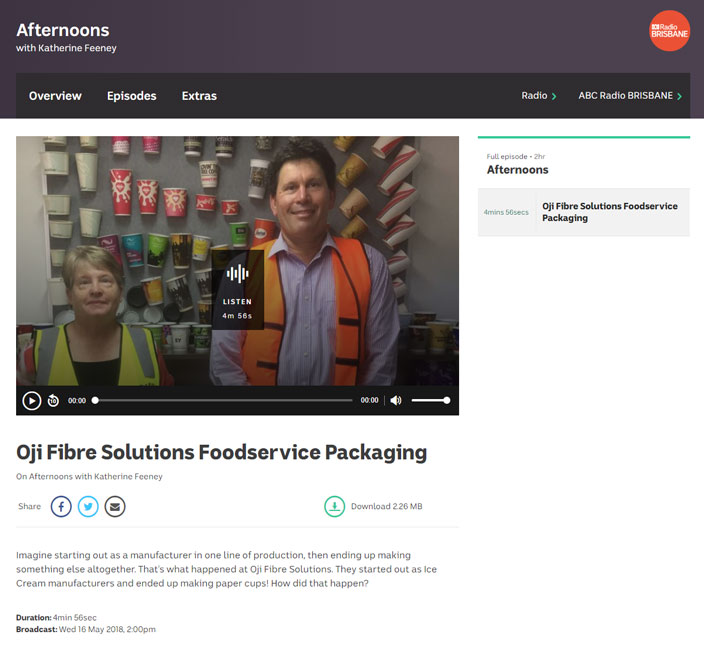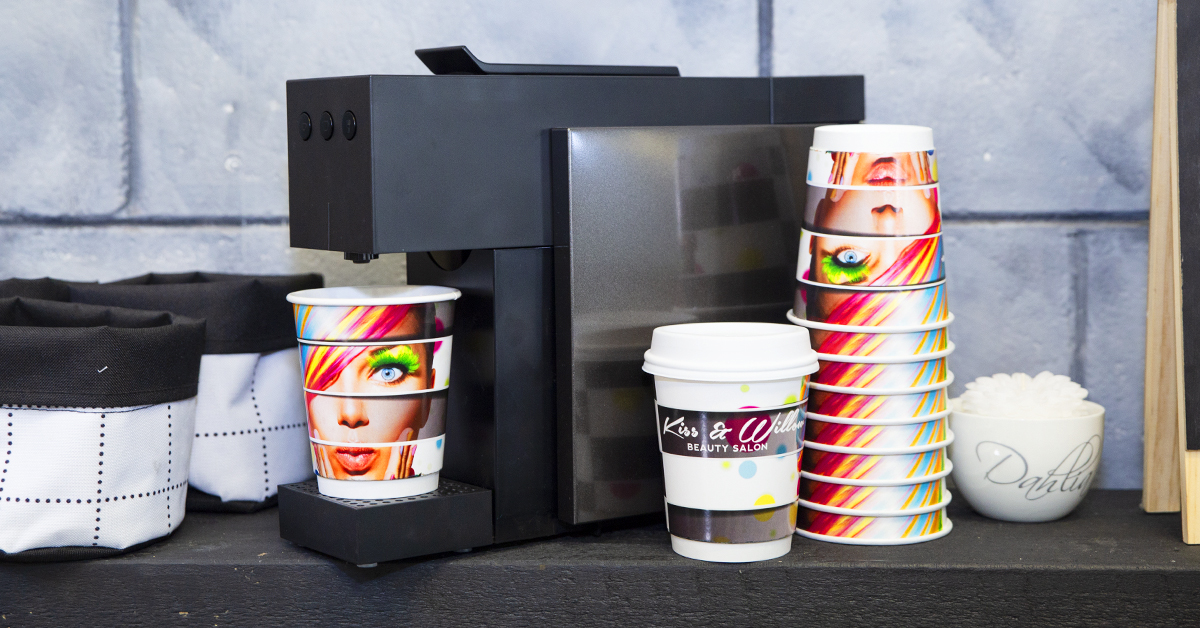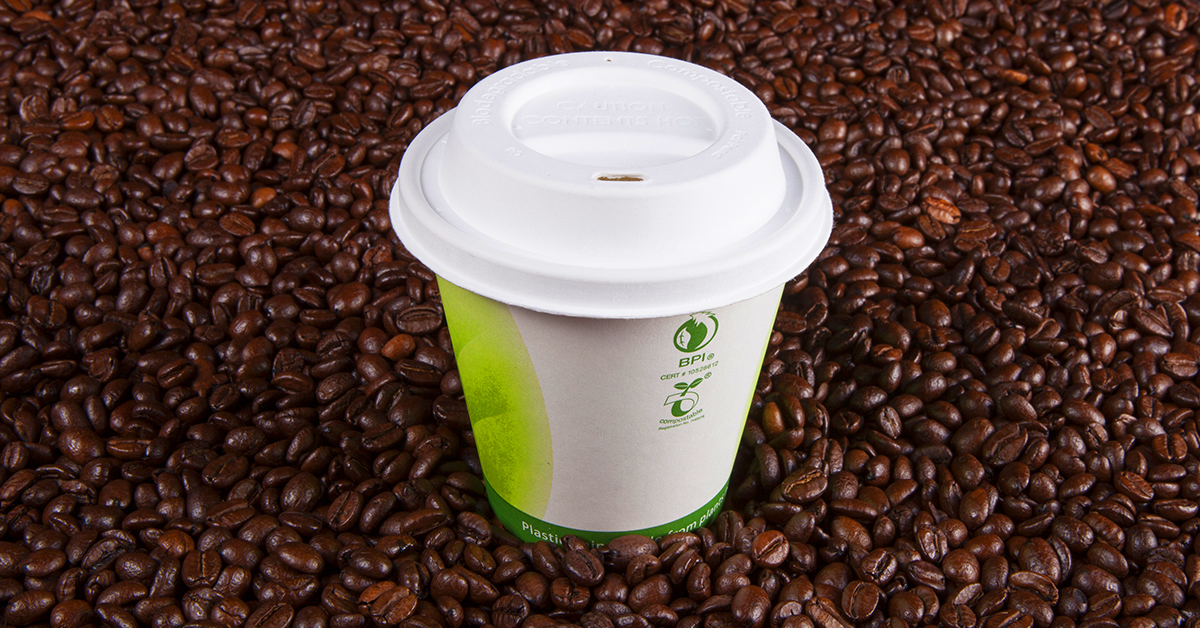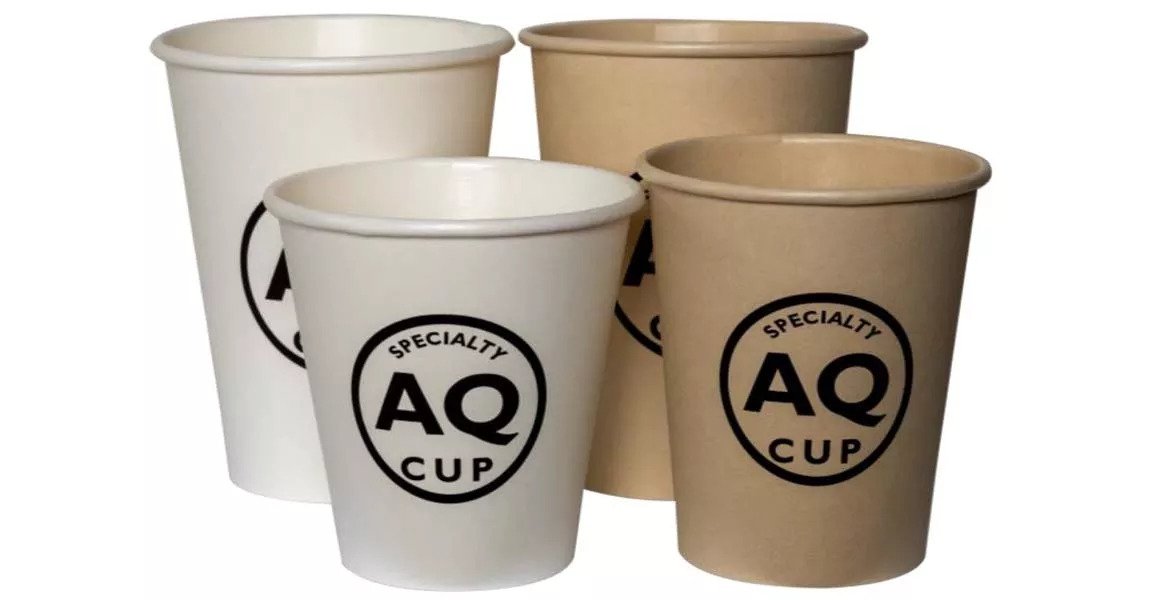From Soft Serve Ice Cream Makers to Paper Cup Manufacturers [As Seen on ABC Radio]
![From Soft Serve Ice Cream Makers to Paper Cup Manufacturers [As Seen on ABC Radio]](https://www.ojifsfoodservice.com.au/media/blog/ABC-Radio-Shoutout_xLong-6.jpg)
From Ice Cream To Paper Cups - How Did That Happen?
Manager of Oji Fibre Solutions Foodservice Packaging, Helen David, and National Sales Manager, Andrew Fletcher are interviewed by Peter Gooch from ABC Radio. The trio discuss the 30 Year journey that the factory has taken - starting out as Soft Serve Ice Cream suppliers to becoming one of the largest Paper Cup & Packaging Suppliers.
Listen To The Full Interview Here:

Read the full Transcript here:
Katherine Feeney: Think about the number of paper coffee cups that you’ve seen around the place – Brisbane, Gold Coast, Logan, Ipswich, Moreton Bay – anywhere. Think about them. Lots, right? Did you know that most of the coffee cups that you’ve seen or used in South-East Queensland actually come from a little factor down in Kingston, Logan? I didn’t know this! There, they make everything from coffee cups to those bucket heads that you might see at the Big Bash. But, they didn’t start out making coffee cups. Their core product was soft-serve ice cream! Now, Peter Gooch [from the ABC] went down to the factory where he caught up with Helen David, who is the manager of Oji Fiber Solutions Foodservice Packaging and the National Sales Manager, Andrew Fletcher.
Andrew Fletcher: The business started 30 years ago back in the mid-80s. It was started by an entrepreneur named Ross Tisch that saw some rapid growth through the 80s. Expo was a particularly big year and then the business continued to grow until the 90s when Ross sold the business to a couple of corporate owners. Since then, we’ve been owned by Carter Holt Harvey which is a large New Zealand concern. And in the last couple of years we were purchased by Oji which is a Japanese business and they've invested quite heavily in Queensland including our business.
Peter Gooch: I think the most extraordinary thing is that this organization started out running ice cream and now it's a Paper Cup Manufacturer. Is that the best way to describe it?
Andrew Fletcher: Yeah, I guess that’s pretty accurate. Back in the mid-80s, Ross was operating a soft-serve Factory in Slacks Creek and he had need for Paper Cups. He'd just found he couldn’t get reliable service or quality locally, so he decided, “What the heck! I’ll buy some cup machines and see if I can make my own!”
Peter Gooch: What kind of a guy was he? Because that's a hell of a step isn't it to jump from one operation entirely into another altogether.
Andrew Fletcher: Yeah, Ross was your typical entrepreneur that like to have the gold chain on and drive the big Mercedes and make a statement wherever he went. He lived big and he thought big - that’s pretty right, that's spot-on.
Peter Gooch: Now Helen, you're the CEO of the organization, tell us what you've seen over the years.
Helen David: Well actually I've seen quite a bit because I was actually subcontracting to this business for about 10 years before they took me on full-time as the accountant. So, I've seen the growth and from bookkeeping to accounting to putting computers in which Ross absolutely detested but knew he had to put computers in to sell the business. So, that's what he did. He didn't care if they worked or not as long as when the buyers came in, it looked like we were computerized! So, that's the sort of guy that he was. Then when Carter Holt Harvey and International Paper took us over, they offered me the job as a full-time accountant. So, I've been here 20 years since then.
Peter Gooch: The road ahead, fairly optimistic?
Helen David: I have to say - I like to keep optimistic but Chinese imports are really our worst enemy. Because it costs us to make it about the same as what we can import it. So, why manufacturer it? You can't recover your overheads on that work. So, we've actually gone down a bit of a different road and said, “what can’t the Chinese do?” And what they can’t do is short runs and quick service. So, we have invested in digital technology so that we can do short runs and get them out of here under a week. Somebody wants one box of cups, we can now do it. Whereas before it was how many “hundred thousand” do you want - now it's “how many cups do you want”. And that's actually proven to be quite successful for us and we do need to grow that business obviously, but it’s quite different from mass manufacturing.
Peter Gooch: Yeah and what you’re talking about there is Specialized Cups for special events perhaps.
Helen David: Special events, Advertising, Openings, School Fates, Hairdressing Salons, Motor Vehicle Sales Yards, all sorts of people have coffee - everybody has coffee nowadays.
Peter Gooch: Right, here we are out on the floor and it’s not the noisy part. We're looking at the actual Paper; the cardboard that the Cups are made out of on big rolls. Helen, tell us what's happening here.
Helen David: So, we print the rolls here [in-house] on our flexographic press. We have a six-color flexographic press and it uses water-based inks. So here we're looking at a Single-Wall Coffee Cup, so this has only got PE on one side and not on the other and that is because the PE actually helps to transmit the heat. So, a Single-Wall Cup has got no coating on the outside of the wrap.
Peter Gooch: When you say PE, what is it?
Helen David: Polyethylene. It's a waterproofing plastic and we also where we melt the plastic to form the Cup; you've got to have some way of sealing a Cup so that's how we actually seal the Cup.
Peter Gooch: Okay, here we are we're in the main part of the factory where the Cups are made. They're whizzing all around; going through these big plastic tubes. And it really is quite something - a lot of activity going on. Tell us what’s happening exactly Helen.
Helen David: Well, down this end we're actually die-cutting the sidewall of the Cups. These machines work at about 360 to 380 beats per minute. And the roll goes on the Back and the side wall comes out the front.
Peter Gooch: Why are these cups racing all over the place like this over our head here?
Helen David: Well, because they are being transferred from a machine to a machine. So a Coffee Cup with an Inner-Cup gets made, and then it has to go and get the Wrap put on it to make a Double-Wall Cup. And other than that, they go through the chute to go to the Auto-Baggers.
Peter Gooch: You can sit here watching it all day - it's quite a show.
Helen David: It's certainly mesmerizing, I love coming out to the factory I just and I like to hear the machines working.
Peter Gooch: It’s like being in some kind of ride inside of a theme park isn't it?
Helen David: I don’t say that – but they Cups might feel like that at times!
Katherine Feeney: There you have it – and another little nod to Expo 88. That was Helen David, who is the manager of Oji Fibre Solutions Foodservice Packaging with Peter Gooch.

![Factory's Cups Runneth Over [As Seen In The Courier Mail]](https://www.ojifsfoodservice.com.au/media/blog/Courier-Mail-Shoutout-7.jpg)






